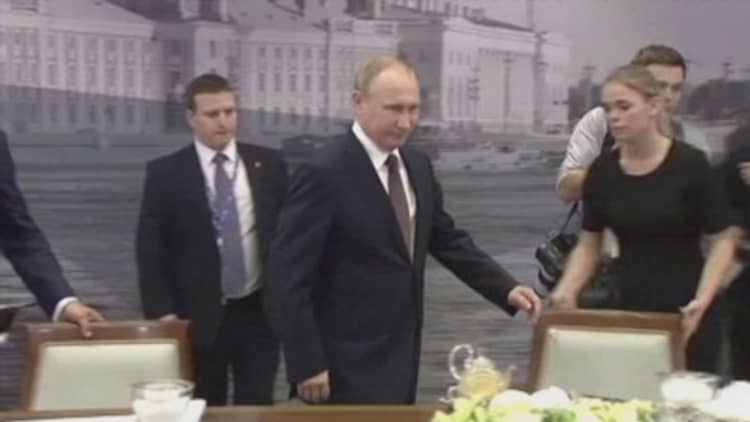
The Russian news media, which often push the agenda of President Vladimir Putin, have said little about the accusations that Russia hacked the Democratic Party in an attempt to influence the U.S. presidential election.
Thousands of hacked internal emails between Democratic officials were made public by WikiLeaks on the eve of the party's national convention. The most inflammatory among them indicated that Democratic National Committee officials including Chairwoman Debbie Wasserman Schultz were aiding the campaign of Hillary Clinton while was still a contender.
Citing computer experts, a top Clinton campaign official said Russia was behind the leak. The autocratic Putin is said to prefer Republican candidate Donald Trump, who among other things has implied that the U.S. is not automatically obligated to defend its NATO allies from a military attack.
In Russia, the story has received little mention by the state-controlled media, except when it's repeating government denials.
News reports reviewed by CNBC on Russia's state run NTV and Rossiya-1 indicated that not much, if any, attention was paid to the DNC leaks. Monday evening newscasts focused on the Olympics, energy issues and recent shootings in Florida and Germany.
When they have covered the DNC leaks, the Russian media have taken the official Kremlin line as reiterated by Putin's press secretary, Dmitry Peskov.
Peskov has vehemently denied accusations that the Russians were behind the DNC hack, saying "I am completely ruling out the possibility that the government or any government agencies were tied to this."
Russia has the capabilities, and the timing also provides a motivation. The Kremlin strongly believes the U.S. government has been behind similar efforts against Russia — a la the Ukraine and Georgia revolutions.Ian Bremmerpresident, Eurasia Group
Vladimir Frolov, foreign affairs columnist for Russian magazine Slon and contributor to the Moscow Times, told CNBC that although the Russian media are more favorable toward Trump, news outlets are treating the latest hack with "extreme caution."
"The media is not even repeating the accusations made by the Clinton campaign," he said, "instead ignoring them and just repeating Peskov's denials."
An exception was the independent television channel Dozhd (TV Rain) where the DNC leak was one of the top stories. The channel reported the alleged ties to Russia and played the coverage straight, discussing the main issues in the broader context of DNC events and the U.S. election. Dozhd said it's unprecedented for political meddling in the United States to be blamed on a foreign entity.
A Russian oligarch who spoke to CNBC on condition of anonymity for privacy concerns said that although he is unsure about whether the Russian government was directly involved in the recent hacks, the majority of Russians are backing Trump nonetheless.
"And in the media, an image is being created negatively toward Hillary Clinton and positively toward Trump," he said.
Secretary of State John Kerry brought up the issue in meetings with his Russian counterpart, Sergey Lavrov, while in Laos on Monday, but few details were given as to the outcome of those conversations. On Tuesday, Russian newspapers reported that Lavrov said he "could not find the right un-censored words to comment on these suspicions."
"I don't want to have to use the four-letter words," he told journalists.
Matthew Rojansky, director of the Kennan Institute, said although the Kremlin might want to "stir the pot" a bit in American politics, "what is harder to believe is that Vladimir Putin is specifically picking sides, or that he actually thinks that a blatant external intervention of this type can have a predictable effect on U.S. voters that would necessarily be good for Russia."
Other geopolitical experts in the United States have their suspicions of Putin and his motives.
"Russia has the capabilities, and the timing also provides a motivation," Ian Bremmer, president of the Eurasia Group, told CNBC. "The Kremlin strongly believes the U.S. government has been behind similar efforts against Russia — a la the Ukraine and Georgia revolutions."
Bremmer cautioned that we should wait for the FBI determination to be certain but said, "It looks very suspicious at this point."
WikiLeaks founder Julian Assange told NBC News that "there is no proof whatsoever" that Russian intelligence was behind the release.
Trump's campaign manager, Paul Manafort, has denied that the campaign or Trump himself was colluding with Russia.
Trump scoffed at the allegations.


